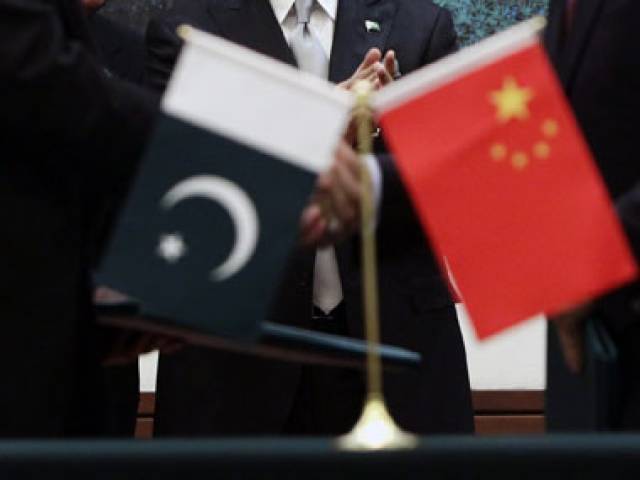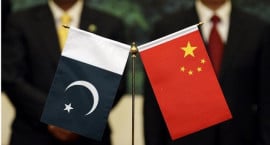
In order to avoid any possibility of default, Chinese investors have demanded that Pakistan place funds in offshore bank accounts to service debts incurred for setting up energy plants under the China-Pakistan Economic Corridor (CPEC).
The Pakistani authorities have not yet accepted the investors’ demand, citing the country’s history of never defaulting on Chinese energy debt repayments, even during periods of critically low reserves. Islamabad is also cautious about potential reactions from the International Monetary Fund to any new concessions to Beijing.
Highly placed sources informed The Express Tribune that Chinese authorities were also pressing Pakistan to clear $125 million in dividends owed to Chinese firms operating in Pakistan.
Cabinet ministers and high-ranking government officials convened on Monday to finalise Pakistan’s stance on these contentious energy-related issues. Finance Minister Muhammad Aurangzeb urged caution in accepting any Chinese demands due to sensitivities surrounding upcoming bailout programme talks with the IMF, according to the sources.
During a preparatory meeting ahead of the Joint Working Group (JWG) on Energy gathering in Beijing next week, sources said Governor of the State Bank of Pakistan (SBP) Jameel Ahmad raised these concerns. A Pakistani delegation is expected to depart for Beijing to participate in the JWG on Energy meeting by the middle of this month.
China has established energy projects in Pakistan with a 75% debt and 25% equity investment. The estimated value of these Chinese energy projects is nearly $21 billion, with Chinese debt for energy projects totalling around $16 billion. The country needs to make annual payments of about $2.4 billion toward debt and dividends.
Sources revealed that the central bank governor informed the meeting that Chinese investors were seeking placement of funds in offshore bank accounts equivalent to the amount Pakistan would require for energy-related debt repayments.
A federal government official stated that a Chinese investor was experiencing difficulty obtaining new loans due to financial troubles in Pakistan. To address banks’ concerns, investors were now seeking to place funds in offshore accounts to demonstrate their revenue streams, he added.
The central bank’s response was awaited until the filing of the story.
Sources indicated that the SBP believed Pakistan should not concede to the Chinese demand, as it cannot afford to keep current reserves idle for future debt repayments. Accepting such a demand could also open the door for other foreign investors.
Commercial loans for establishing power plants had been secured at an interest rate of the London Interbank Offered Rate (Libor) plus 4.5%.
Despite the IMF programme, Pakistan’s reserves remained at $9 billion, largely accrued through foreign loans and purchasing $5 billion to $5.5 billion from the open market.
Due to thin foreign exchange reserves, the central bank was not freely allowing outward flow of funding and had also tightened checks on dividend repayments.
Sources revealed that the Chinese also demanded immediate clearance of at least $125 million in dividends. The federal government urged the SBP to clear funds before May 15 to send a positive signal to Beijing ahead of the JWG meeting.
The meeting also addressed the issue of pending dues totalling Rs517 billion to Rs529 billion for Chinese energy projects that Pakistan is unable to clear due to fiscal constraints and lack of foreign currency reserves. However, no decision was reached on this matter, as both the Ministry of Finance and the energy ministry expressed inability to allocate additional funds.
Power purchase payments to Chinese suppliers were not matching their invoices due to Pakistan’s failure to address circular debt and implement the Energy Framework Agreement as stipulated.
For the fiscal year 2024-25, the government plans to allocate Rs48 billion to clear Chinese dues, but this amount is insufficient and will not address the financial concerns of Chinese power plants.
The outstanding dues of Rs529 billion from the CPEC’s independent power producers (IPPs) were a major obstacle to the financial closure of key projects.
Under a 2015 agreement, Pakistan is legally obligated to establish a revolving fund to protect Chinese investors from circular debt. The government has opened a Rs48 billion account, which is inadequate for the purpose. The Chinese government has not accepted this arrangement and is urging Pakistan to honour its agreements.
Due to the delay in settling the Rs529 billion dues, two Chinese-sponsored power plants with a combined capacity of 1,824 megawatts are facing difficulties in achieving financial closure.
Pakistan proposed May 24 as the date for the 12th Joint Cooperation Committee (JCC) meeting and is awaiting a response from China.
The government also discussed the possibility of converting imported coal from Chinese power plants to local coal. It emerged from the meeting that Chinese investors would provide approximately $500 million for the investment required to convert their projects to coal.
However, the likelihood of such new Chinese investment was deemed very low due to the financial challenges facing investors.
Published in The Express Tribune, May 7th, 2024.
Like Business on Facebook, follow @TribuneBiz on Twitter to stay informed and join in the conversation.

1730893413-0/miley--(1)1730893413-0-405x300.webp)

1725522296-0/BeFunky_-(43)1725522296-0-165x106.webp)

1729080111-0/BeFunky-collage-(63)1729080111-0-165x106.webp)
1730892765-0/Express-Tribune--(11)1730892765-0-270x192.webp)














COMMENTS
Comments are moderated and generally will be posted if they are on-topic and not abusive.
For more information, please see our Comments FAQ